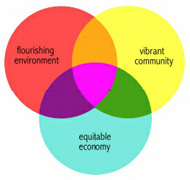"What is sustainability” is most often defined by this statement:
- 1987 Our Common Future UN World Commission on Environment and Development.Bruntland Commission. “Development that meets the needs of the present generation without compromising the ability of future generations to meet their own needs. In principle, every generation must leave behind good environmental quality. This means that existing environmental problems must be resolved within the span of one generation (20- 25 years) while the creation of new problems must be prevented. For the current generation, the environmental legacy from the past must also be reduced to acceptable proportions.”
Sustainability is a way of working and living that balances immediate needs for commerce, living, habitation, food, transportation, energy and entertainment with future needs for these resources and systems as well as the liveliness and support of nature, natural resources and future generations.
Sustainability addresses human and natural systems (such as social justice, meaningful experiences, social values, biodiversity, ecosystem services and lifecycle food chains) as well as economic systems (such as market viability, profit and returns) in order to meet needs and desires without endangering the viability of future generations or endeavors. It is similar to the "seventh generation" philosophy of the Native American Iroquois Confederacy, mandating that chiefs always consider the effects of their actions on their descendents seven generations in the future.
Sustainable thinking would include:

Whole-systems thinking
Humane and biocentric focus
Learning and innovation
Leadership and partnership
Spirituality
Click here to view and download " Sustainability and Food Systems" powerpoint
Please see our Links page for more information.






